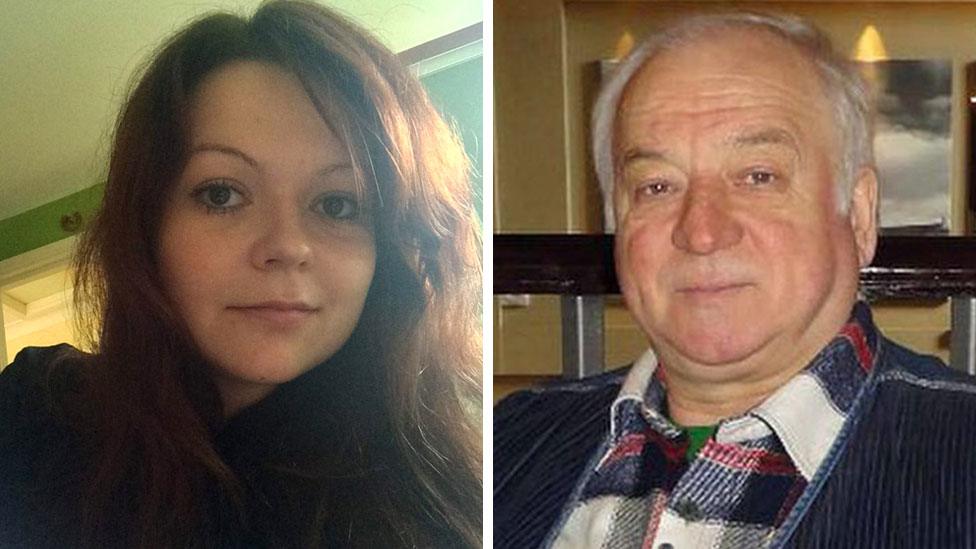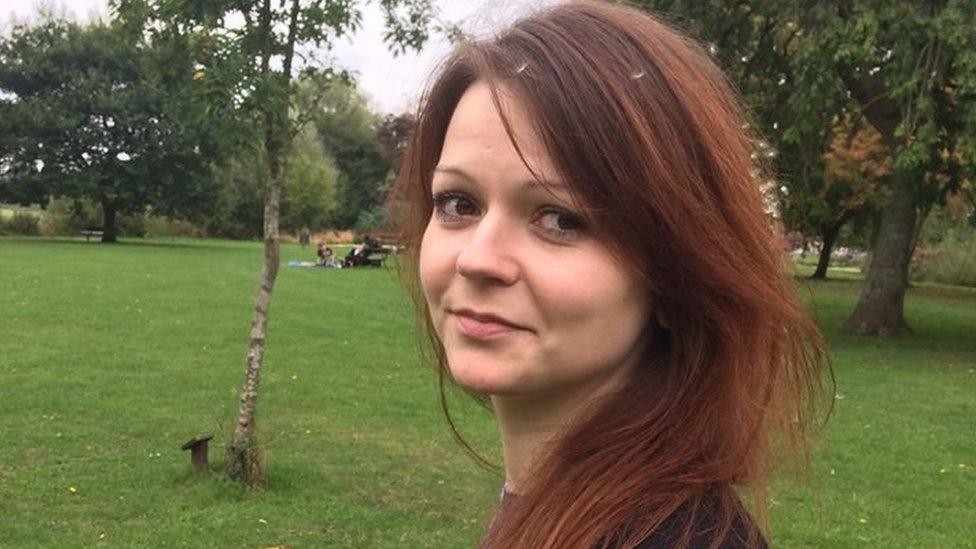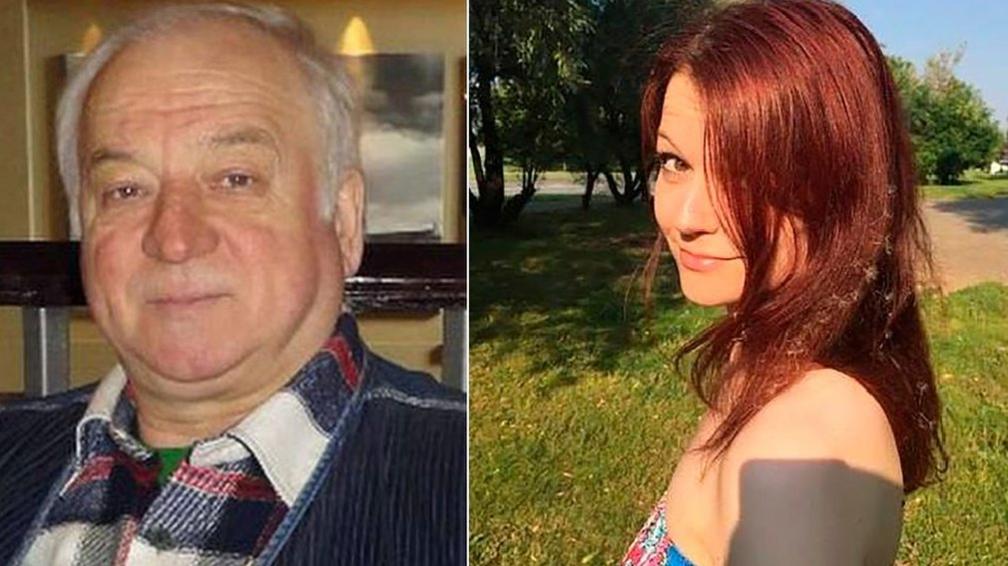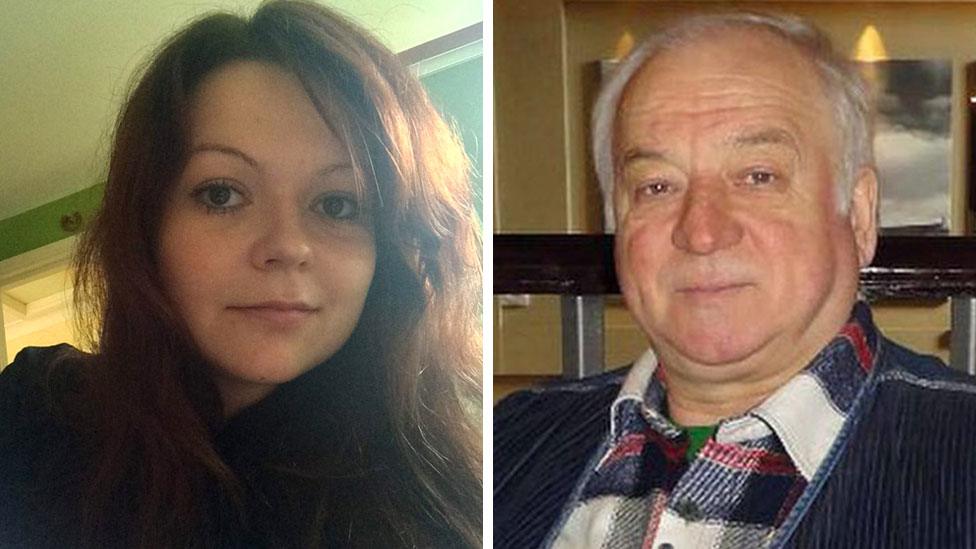Spy poisoning: Russia says UK is 'playing with fire'
- Published
Moscow's UN ambassador Vasily Nebenzia: "You are playing with fire and you will be sorry"
Russia has accused the UK of inventing a "fake story" and "playing with fire" over the Salisbury spy poisoning.
At a UN Security Council meeting, Moscow's UN ambassador Vasily Nebenzia said Britain's main goal had been "to discredit and even delegitimise" Russia with "unsubstantiated accusations".
The UK says Russia is behind the attack but Moscow denies responsibility.
Britain's UN representative Karen Pierce said the UK's actions "stand up to any scrutiny".
She likened Moscow's requests to take part in the investigation to an arsonist investigating his own fire.
Russian former spy Sergei Skripal and his daughter Yulia were found unconscious in Salisbury on 4 March.
Ms Skripal, 33, is recovering in hospital and has released a statement saying her "strength is growing daily".
Her father, 66, remains critically ill but stable.
Meanwhile it has emerged that when police sealed off Mr Skripal's home at the start of the investigation. there were two guinea pigs and a cat inside. The BBC understands the guinea pigs died of starvation and the cat, distressed from dehydration, was put down.
'Propaganda war'
Moscow called the special meeting of the Security Council in New York to discuss the attack, saying Britain had "legitimate questions" to answer.
Mr Nebenzia said the accusations were "horrific and unsubstantiated", and claimed the UK was waging a "propaganda war" against Russia.
He said Novichok - the group of nerve agent used in the poisoning - is "not copyrighted by Russia, in spite of the obviously Russian name" and has been developed in many countries.
"It's some sort of theatre of the absurd. Couldn't you come up with a better fake story?" he asked.

Sergei Skripal, 66, and his daughter Yulia, 33, remain in hospital
In his statement to the 15-member council, Mr Nebenzia questioned why Russia would eliminate someone using a "dangerous and highly public" method.
He contrasted the use of a chemical with the "hundreds of clever ways of killing someone" shown in British series Midsomer Murders.
Responding, the British Ambassador to the UN, Karen Pierce, accused Russia of seeking to "undermine the international institutions that have kept us safe since the Second World War".
She said Russia came under suspicion for several reasons, saying it had "a record of conducting state-sponsored assassinations" and that it "views defectors as suitable targets for assassination".
Ms Pierce told delegates that Russia's request to visit Ms Skripal had been passed on and "we await her response".
"Ms Skripal's own wishes need to be taken into account," Ms Pierce added.
Viktoria, the cousin of Yulia Skripal, says she is 100% certain it was her cousin who rang her
On Friday, former foreign secretary Sir Malcolm Rifkind told BBC Radio 4's Today programme that Russia's comments were a "classic Russian attempt to obfuscate".
He said: "They are in a very serious position because it's not just the UK that has taken action against them. In an unprecedented way, that did not even happen in the Cold War, 29 countries have withdrawn their diplomats."
He also said the UK had shared "highly classified information" with the other countries which was also "unprecedented".
Russian foreign minister Sergei Lavrov said it would be wrong to think Russia would end up "admitting to all terrible sins and saying 'I was wrong, please forgive me, I will now act by your rules'.
Meanwhile, US representative Kelley Currie said Russia was attempting to use the Security Council "for political gains", adding: "This is not a tactic that is appropriate for this body."
'Sophisticated laboratory needed'
The escalating diplomatic crisis between Moscow and the West saw 60 expelled US envoys leave Russia on Thursday.
More than 20 countries have expelled Russian envoys in solidarity with the UK, following Britain's initial expulsion of 23 Russian diplomats.
The UK government has constantly maintained Russia was behind the attack, claiming there is "no other plausible explanation".
Chemical weapons expert Hamish De Bretton Gordon said he had seen some of the intelligence in the Skripals' case and was "100% sure" Russia was responsible.
He told BBC Radio 5 live "we know almost 100%" that Novichok, which requires a "sophisticated laboratory, a lot of money, resources and expertise to make", was made at Shikhany, a military facility "the size of Salisbury" in central Russia, and the agent used in the attack on the Skripals was "military grade".
He added: "We are talking a tiny amount [of Novichok], a quarter of an egg cup full which would be very easy to smuggle."
'Against transparency'
On Wednesday, Russia proposed a joint investigation into the poisoning but the idea was voted down by the Organisation for the Prohibition of Chemical Weapons.
In a press conference, Russian ambassador to the UK, Alexander Yakovenko, said it marked a vote against "transparency".
Meanwhile on Thursday, in a statement issued through UK police, Ms Skripal thanked those who came to her and her father's aid.
It came shortly after Russian TV aired a recording of an alleged phone conversation between Ms Skripal and her cousin.
Doubts were raised over the authenticity of the recording but the cousin, Viktoria, has told Newsnight she is 100% certain it was Yulia.
- Published5 April 2018

- Published4 April 2018

- Published4 April 2018
